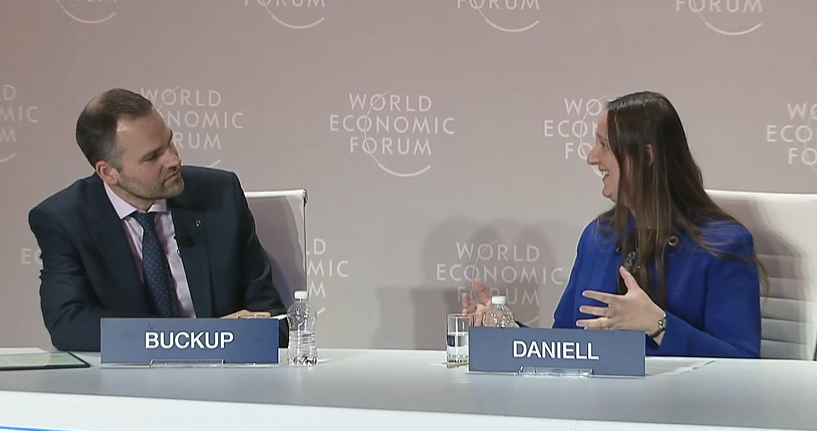What better way for unelected globalists to seize more land and water to power their data centers than to put prices on everything in nature? perspective
Data centers are likely to be built on “prime agricultural land” and will require “a whole lot of water” and energy systems to maintain, according to a World Economic Forum (WEF) panel.
Speaking at the WEF Annual Meeting of the New Champions, aka “Summer Davos,” in Dalian China on Wednesday during a session called “Top 10 Emerging Technologies of 2024” Australian National University School of Cybernetics director Katherine Daniell said that with new technologies comes new responsibilities, ethical considerations, and educational opportunities to help scientists, corporations, and startups become aware of the complex systems that go into these emerging technologies, so that they may act responsibly.
“If we’re going to develop new data centers, they’re likely to go in prime agricultural land; they’re likely to require a whole lot of water, energy systems”
Katherine Daniell, WEF Annual Meeting of the New Champions, 2024
“One of the really important things is helping the scientists and the people creating these technologies to act responsibly while they’re developing them,” said Daniell.
“A lot of that comes back to the education systems on how people are aware of the technologies in that complex systems context.
“If we’re going to develop new data centers, they’re likely to go in prime agricultural land; they’re likely to require a whole lot of water, energy systems.
“How are we developing these really complex, connected systems, and how are we helping the startup founders in their decisions every day to make very small adjustments, for example in their algorithms and in other things that can make a really big difference to the overall situation,” she added.
If you’ve ever wondered why unelected globalists like Bill Gates are buying up huge swaths of farmland, or why they want to sell you fake meat, put prices on water and everything in nature, and have you dependent on intermittent renewables while they push nuclear for themselves, this may be one of the reasons.
The amount of land, water, energy, and investments needed to build data centers is enormous. Demand is only expected to grow.
Speaking at the WEF “Special Meeting on Global Collaboration, Growth and Energy Development” in April, BlackRock CEO and WEF Board of Trustees member Larry Fink told a panel on “Investing Amid Global Fracture,” that in order to build out AI data centers, it will take trillions of dollars of investing and reliable energy sources that aren’t intermittent like wind or solar.
“To power these data companies you cannot have just this intermittent power like wind and solar; you need dispatchable power because you can’t turn off and on these data centers”
Larry Fink, WEF Special Meeting on Global Collaboration, Growth and Energy Development, 2024
“I do believe to properly build-out AI, we’re talking about trillions of dollars of investing,” said Fink.
“Data centers today can be as much as 200 megahertz [sic] — they’re now talking about data centers that are going to be one gigawatt — that powers a city.
“There’s one tech company that I spoke to the CEO last week who said, ‘Right now with all their data centers is about five gigawatts; by 2030 they need 30 gigawatts.’
“Thirty! the amount of power that’s needed to use AI has huge impact on society.
“Where’s that power going to come from? Are we going to take it off the grid? What does it mean for elevated energy prices for everybody else if it’s that?
“I think it’s going to represent some huge societal questions that we have not addressed — the negative side — forget about the use of it, but just the generation of it is massive power. That’s a huge investment opportunity.
“The world is going to be short power, short power! And to power these data companies you cannot have just this intermittent power like wind and solar; you need dispatchable power because you can’t turn off and on these data centers.”
If wind and solar can’t power these data centers that are going to built on prime agricultural land, what type of power could be used?
In a word, nuclear.
At another session of the WEF’s special meeting last April entitled “The Role of New Nuclear,” Axiom Space Executive Chairman Kam Ghaffarian said that nuclear was the way forward.
“The amount of power these data centers need […] If we’re not going to use the fossil fuel — of course we need renewables — but how are we going to solve the problem? Then, you come to this solution that, OK, nuclear”
Kam Ghaffarian, WEF Special Meeting on Global Collaboration, Growth and Energy Development, 2024
“The amount of power these data centers need — I mean I was just talking to a hyper-scaler recently at their conference, and they’re going to need like 10 gigawatts of power by 2030,” said Ghaffarian.
“All the energy formulas that we’ve been thinking about we’ve got to throw out the door, and sort of say how are we going to meet the energy need?
“If we’re not going to use the fossil fuel — of course we need renewables — but how are we going to solve the problem?
“Then, you come to this solution that, OK, nuclear.”
While the unelected globalists push for wind and solar for the common folk, they are simultaneously pushing nuclear for themselves.
And whether it’s miles of wind turbines and solar panels across the landscape, or hectares of nuclear power plants and data centers, they all need significant amounts of prime agricultural land and water to operate.
Speaking of water, back at the Summer Davos in China on Wednesday, University of Cambridge Institute for Sustainability Leadership CEO Lindsay Hooper told the panel on “Understanding Nature’s Ledger” that “every part of the economy is fundamentally dependent on nature,” including, “the air that we breathe, the water we drink, the soil, the oceans that we need for the food that we need to consume, the minerals that we need as inputs to technology and into infrastructure.”
“Nature is treated within the economy as though it’s unlimited, and predominantly as though it’s free”
Lindsay Hooper, WEF Annual Meeting of the New Champions, 2024
In order to protect natural systems like water, Hooper said that “one of the solutions is to bring nature onto the balance sheet; bring nature into the ways that decisions are made within business to allocate a value to it — to bring it into accounting and financial mechanisms.”
In addition to putting “nature on the balance sheet,” another proposal coming at the end of the panel discussion suggested putting a tax on natural systems like water in the same vein as carbon taxes.
“Beyond carbon [taxes] let’s think about other aspects of nature that are easier to quantify […] What about water?”
Gim Huay Neo, WEF Annual Meeting of the New Champions, 2024
In her presentation, WEF managing director for nature and climate Gim Huay Neo said that “integrating natural capital to our accounting framework” should happen soon, stating:
“Today, carbon pricing, ETS [Emissions Trading Systems], carbon taxes really cover about 25 percent of global emissions.
“We should actually look at scaling this to cover all 100 percent of carbon emissions.
“And beyond carbon let’s think about other aspects of nature that are easier to quantify.
“We will probably not be able to quantify everything on day one, but what about water?
“That’s quite possible for us to start integrating systematically into current trading carbon pricing mechanisms.”
What better way for the unelected globalists to seize more land, water, and other natural resources to power their data centers than to put prices on everything in nature?
Image Source: Screen shot of WEF Head of Network and Partnerships Sebastian Buckup (L) and Australian National University School of Cybernetics Director Katherine Daniell (R) from the WEF Annual Meeting of the New Champions panel “Top 10 Emerging Technologies of 2024”











